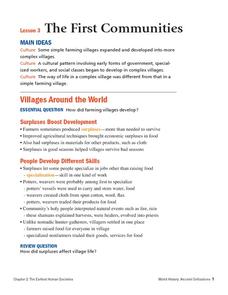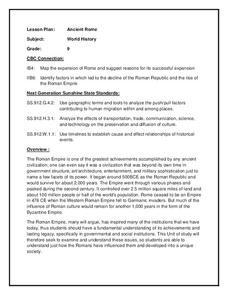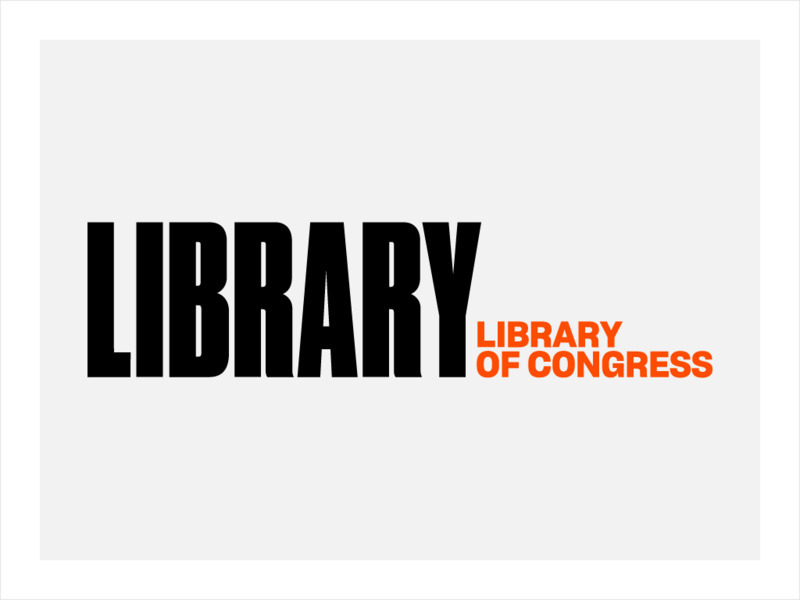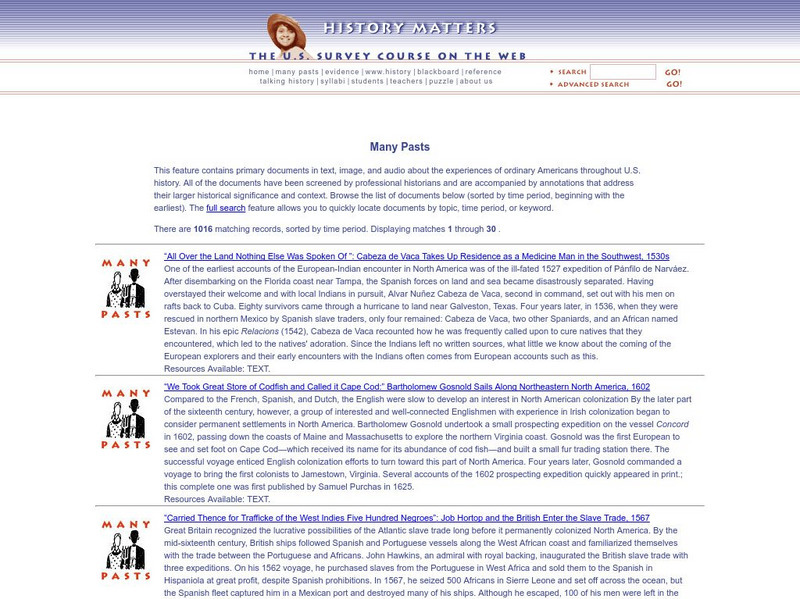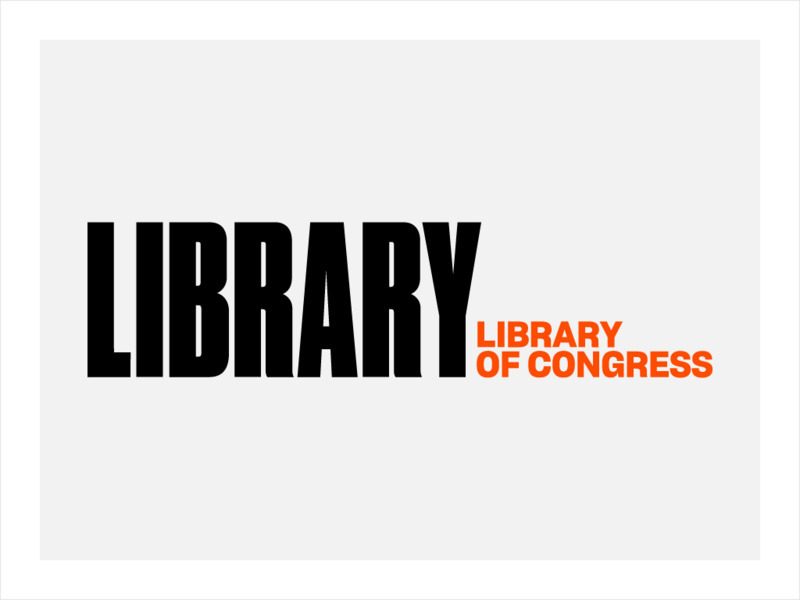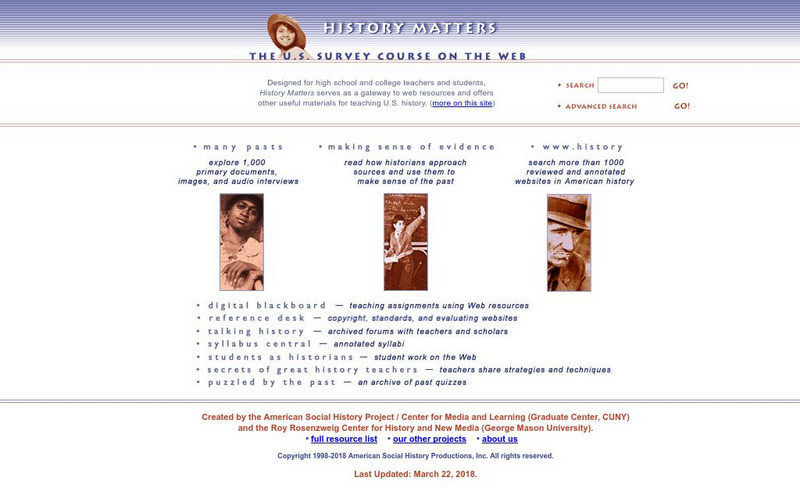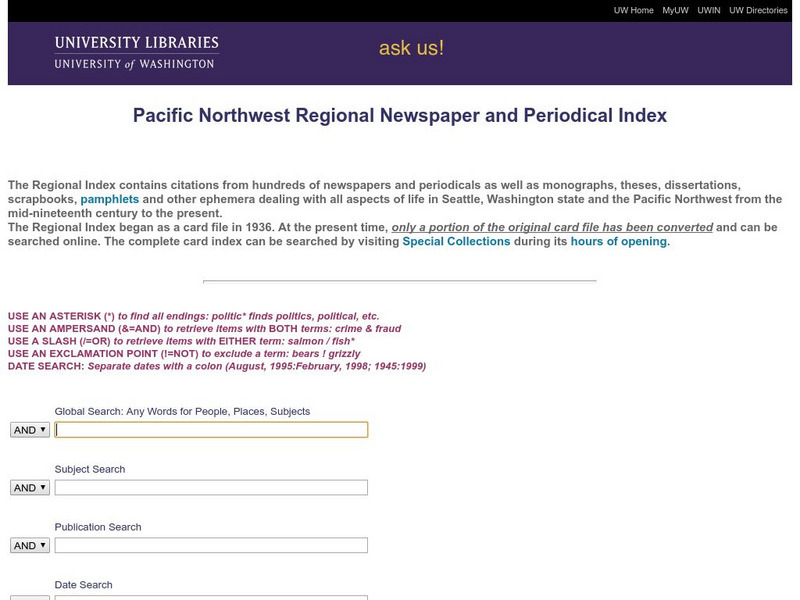Houghton Mifflin Harcourt
The First Communities
These documents list essential questions and foundational concepts associated with early civilizations and farming communities in the agricultural revolution. Use this as a starting point for developing specific lessons and activities...
Curated OER
Centers of the Storm: The Lyceum and the Circle at the University of Mississippi
Greek Revival architecture and the Civil Rights Movement? Sure! Examine how the Lyceum and Circle, two historic buildings located on the campus of the University of Mississippi, relate to integration and the 1962 riot on the university...
Miama-Dade County Public Schools
Ancient Rome
This resource outlines several general activities for a study of Ancient Rome, and includes guiding questions, a handout on the story of Romulus and Remus, and ideas for incorporating mapping and timeline activities into your review.
Houghton Mifflin Harcourt
Renaissance and Reformation Chapter Test
This simple textbook assessment begins with a series of five short answer questions on major ideas from the Renaissance and Reformation. Then, young historians use their knowledge of artistic styles and developments from the period to...
Houghton Mifflin Harcourt
Renaissance and Reformation Test Preparation
This multiple-choice assessment on the Renaissance and Reformation reviews topics from humanism and the protests of Martin Luther to Italian city-states. While this is a traditional assessment designed by a textbook publisher, you can...
Curated OER
The Spread of Enlightenment Ideas
Looking for a simple and straightforward reference on the Enlightenment for your young historians? Check out this list of key terms and important figures from the period, followed by a traditional assessment where your learners will be...
National Park Service
Freedom at Antietam
Explore how the issuance of the Emancipation Proclamation affected everyday individuals in the Civil War era. Learners are given the opportunity to read and evaluate primary and secondary source material, and then to compose a writing...
National Endowment for the Humanities
The Debate in the United States over the League of Nations: Five Camps: From Voices of Consent to Voices of Dissent
Learners explore and discuss Woodrow Wilson's concepts for peace and the League of Nations. They understand efforts made to foster American support for the League and discuss the opposition shown in the Senate.
Curated OER
Cartoons for the Classroom: A Parody of Broken Promises
Parodies of political figures are the lifeblood of the editorial cartoons in a free press. North Korea's nuclear threat provides young political scientists an opportunity to hone their critical thinking skills as they analyze a...
National Endowment for the Humanities
Slavery and the American Founding: The "Inconsistency Not to Be Excused"
High schoolers examine slavery in the revolutionary and colonial eras of the United States. In this slavery lesson, students investigate the presence of slavery in early America, the language of the Constitution, and the intent of the...
National Endowment for the Humanities
Lesson 3: Religion and the Fight for American Independence
Pupils explore the role religion played in the American Revolutionary War. Using primary documents and writing exercises, students understand how religion was used in support of the war efforts and how specific religious groups responded...
National Endowment for the Humanities
Lesson 2: The Debate in Congress on the Sedition Act
Pupils research and discuss the provisions in the Constitution that supported the arguments for and against the Sedition Act. They articulate objections to and arguments in favor of the Sedition Act.
National Endowment for the Humanities
Chinua Achebe's Things Fall Apart: Oral and Literary Strategies
Readers are first introduced to Chinua Achebe's Things Fall Apart by making a map of Africa. They will better understand the novel's historical and literary contexts, European and African literary traditions, and how...
Library of Congress
Loc: Teacher Resources
This compilation of teacher resources has useful collections of primary sources, lesson plans, themed subject overviews, and ready-to-use presentations and activities to support the study of U.S. history at all academic levels.
Library of Congress
Loc: Primary Sources by State
An interactive map to search for extensive collections of primary sources for each of the United States.
Curated OER
History Matters: Many Pasts
These primary source documents are about ordinary Americans throughout US history. There is a full search feature. All the historical documents, whether they are text, image, or audio, have been vetted by a historian. They are initially...
Library of Congress
Loc: For Teachers: Analyzing Primary Source Documents
These student worksheets and activities help students analyze many different types of primary source documents. Life histories, objects, and photographs are all used to engage students.
Library of Congress
Loc: How to Find a Novel,etc. Without Knowing Its Title or Author
Use this guide to help identify a literary work when they know only its plot or subject, or other textual information such as a character's name, a line of poetry, or a unique word or phrase. Trusted databases, library catalogs, and more...
Curated OER
History Matters: The u.s. Survey Course on the Web
Designed for high school and college teachers and students, History Matters serves as a gateway to web resources and offers other useful materials for teaching U.S. history.
Brigham Young University
Euro Docs: Online Sources for European History
Connect to primary source documents (facsimiles. transcriptions, translations) that trace the history of Europe.
Internet History Sourcebooks Project
Fordham University: Medieval Sourcebook: History Through Primary Sources
This site from the Medieval Sourcebook answers the question: Why Study History Through Primary Sources? It provides complete information, a list of review questions, and bibliography information.
Scholastic
Scholastic: News Writing With Scholastic Editors
An excellent site for learning about news writing. This site is an in-depth workshop that takes you through the news writing process step by step by providing examples and tips.
University of Missouri
Interpreting Citations Tutorial
Want to make sense of the crazy-looking symbols and abbreviations in many periodical indexes? This clearly presented, quick tutorial can show you exactly what each strange symbol and abbreviation means.
University of Washington
Pacific Northwest Regional Newspaper & Periodical Index
Covering newspapers, magazines, monographs, theses, dissertations and other material, this index goes back as far as the mid-nineteenth century. Very useful for locating primary source material on the Pacific Northwest region.


